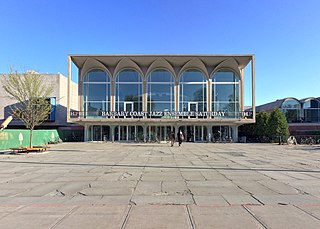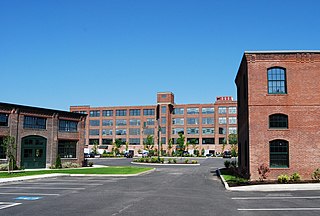
White River Junction is an unincorporated village and census-designated place (CDP) in the town of Hartford in Windsor County, Vermont, United States. The population was 2,528 at the 2020 census, up from 2,286 in 2010, making it the largest community within the town of Hartford.

Johnson State College was a public liberal arts college in Johnson, Vermont. Founded in 1828 by John Chesamore, in 2018 Johnson State College was merged with the former Lyndon State College to create Northern Vermont University. In July 2023, Castleton University, Northern Vermont University-Johnson, Northern Vermont University-Lyndon, and Vermont Technical College merged to become Vermont State University.

Hopkins Center for the Arts at Dartmouth College is located at 4 East Wheelock Street in Hanover, New Hampshire. The center, which was designed by Wallace Harrison and foreshadows his later design of Manhattan's Lincoln Center, is the college's cultural hub. It is home to the drama and music departments. In addition to these fields, the Hopkins Center, or the "Hop" as it is called by students, has a woodshop and jewelry studio which are open for use by students and the public.

The Center for Cartoon Studies (CCS) is a two-year institution focusing on sequential art, specifically comics and graphic novels. It is located in the village of White River Junction within the town of Hartford, Vermont. The Center offers a Master of Fine Arts degree, both one and two-year certificate programs, and summer programs. It is "the only college-level training program of its kind in the United States."

Tastykake is a line of snack foods manufactured by the Tasty Baking Company, headquartered at the Philadelphia Navy Yard in Philadelphia, Pennsylvania. Established in 1914 by Philip J. Baur and Herbert T. Morris and originally selling its product only in the Philadelphia metropolitan area, the company now distributes its products in several states on the East Coast, south to Florida, and has been gradually expanding across the United States.

Dartmouth–Hitchcock Medical Center (DHMC), the flagship campus of the Dartmouth Health system, is the U.S. state of New Hampshire's only academic medical center. DHMC is a 507-inpatient bed hospital and serves as a major tertiary-care referral site for patients throughout northern New England. As an academic medical center, DHMC offers primary, specialty and subspecialty care as well as education and research in partnership with the Geisel School of Medicine at Dartmouth, one of America's oldest medical schools, as well as the Thayer School of Engineering at Dartmouth and The Dartmouth Institute for Health Policy & Clinical Practice.

Chelsea Market is a food hall, shopping mall, office building and television production facility located in the Chelsea neighborhood of the borough of Manhattan, in New York City. The Chelsea Market complex occupies an entire city block with a connecting bridge over Tenth Avenue to the adjacent 85 Tenth Avenue building. The High Line passes through the 10th Avenue side of the building.
Tip Top is a slang phrase which means of the highest order or excellent. Tip Top, Tip-Top or TipTop may refer to:

Helms Bakery was an industrial bakery on the border of Los Angeles and Culver City, in Southern California, that operated from 1931 to 1969. Currently the buildings have been adapted for use as retail shops, restaurants, and furniture showrooms; the complex is part of what is now called the Helms Bakery District.

The King Arthur Baking Company, formerly the King Arthur Flour Company, is an American supplier of flour, ingredients, baking mixes, cookbooks, and baked goods. It also runs two baking schools, one at its Norwich, Vermont bakery and the other in Burlington, Washington.

Lebanon College was a two-year private not-for-profit college located in Lebanon, New Hampshire. It was founded in 1956, and closed in 2014, due to financial difficulties. In 2015 Lebanon College facilities and certain programs were purchased by the public community college system of New Hampshire. After renovations to the main academic building, the Lebanon campus of River Valley Community College opened in January 2016.
Judith Brown was an American dancer and a sculptor who was drawn to images of the body in motion and its effect on the cloth surrounding it. She welded crushed automobile scrap metal into energetic moving torsos, horses, and flying draperies. "One of the things that made Judy stand out as an artist was her ability to work in many different mediums. Some of this was by choice, and sometimes it was by necessity. Her surroundings often dictated what medium she could work with at any given time. After all, you can't bring you're welding gear with you to Rome."
The Junction is a 20-acre (8.1 ha) entertainment, retail, office, and residential complex in downtown Ogden City, built on the site of the former Ogden City Mall. Its development has been coordinated and subsidized by Ogden City, in an effort to revitalize the city center for economic and cultural growth. The city has worked in partnership with the Boyer Company, The Church of Jesus Christ of Latter-day Saints, Wells Fargo, and other private companies. The Ogden City Mall featured in the video for the pop music hit "I Think We're Alone Now" by Tiffany Darwish.

The Rumford Chemical Works and Mill House Historic District is a historic district encompassing the remnants of the Rumford Chemical Works, a historical chemical plant in East Providence, Rhode Island, founded by Eben Horsford and George F. Wilson.

Schmidt Baking Company is a bakery in Baltimore, Maryland, U.S. The company makes Schmidt's Blue Ribbon and Schmidt's Old Tyme Breads and, as a licensee of the Quality Bakers of America Cooperative, bakes and distributes Sunbeam Bread in its territory.

Carlo's Bake Shop, commonly known as Carlo's Bakery and also known as Carlo's City Hall Bake Shop, is a bakery in Hoboken, New Jersey, owned by Buddy Valastro. The bakery has gained public attention as the setting of the TLC television series, Cake Boss.

Angel Bakeries, also known as Angel's Bakery, is the largest commercial bakery in Israel, producing 275,000 loaves of bread and 275,000 rolls daily and controlling 30 percent of the country's bread market. With a product line of 100 different types of bread products and 250 different types of cakes and cookies, Angel sells its goods in 32 company-owned outlets nationwide and distributes to 6,000 stores and hundreds of hotels and army bases. It also exports to the United States, United Kingdom, France, Belgium and Denmark.

The Russell Industrial Center is an industrial factory turned to commercial complex of studios and shops that is located at 1600 Clay Street in Detroit, Michigan. The Russell Industrial Center is a 2,200,000-square-foot (200,000 m2), seven building complex, designed by Albert Kahn for John William Murray in 1915. It contains studios and lofts and serves as a professional center for commercial and creative arts.

The Continental Baking Company was one of the first bakeries to introduce fortified bread. It was the maker of the Twinkie and Wonder Bread. Through a series of acquisitions and mergers it became part of the former Hostess Brands company.
General Host Corp. was a New York-based food and food-related company. It was also the owner of Frank's Nursery & Crafts until the company's bankruptcy in 2004.














